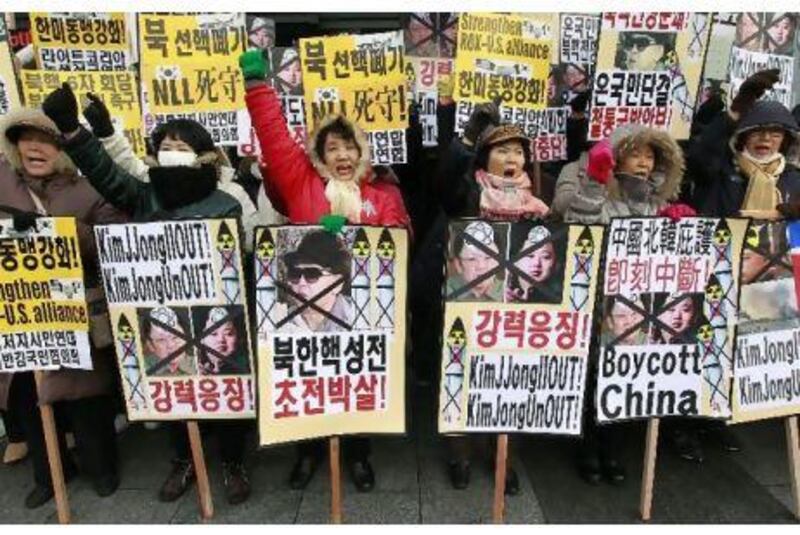BEIJING // South Korea is reportedly looking to promote unification with its northern neighbour, a move that has sparked a stinging response from Chinese state media.
The conservative-leaning newspaper Dong-a Ilbo reported that Seoul was "devising measures to mobilise reunification costs and collaborate with neighbouring countries in preparing for reunification".
A report on the prospects for unification is due to be presented to the South Korean president, Lee Myung-bak, today following comments from Mr Lee this month that "the two Koreas will have to co-exist peacefully and, in the end, realise reunification".
While both Koreas have unification of the peninsula as their stated aim, they have moved further apart this year, with the sinking in March of a South Korean ship blamed on Pyongyang, and the recent bombardment by the north of the island of Yeonpyeong.
Dong-a Ilbo, a South Korean newspaper, reported yesterday that Seoul was "changing its policy direction for reunification of the Korean Peninsula", with the unification ministry preparing "for righteous national reunification".
South Korea, the newspaper said, "must proactively pursue a policy that can help advance reunification" based upon the south's "absorption" of its northern neighbour.
Another conservative daily, The Chosun Ilbo, quoted an unnamed government official yesterday as saying the government was looking to promote measures "that can bring about changes among the North Korean people".
Media in China, North Korea's main donor and diplomatic ally, reacted angrily, with the Global Times accusing Seoul of "behaving like a bull in a china shop" and stoking already high tensions.
The proposals, according to the Global Times, "will hardly enhance ties between the two sides", with South Korea "adopting moves that go against its wider goals".
In a speech this month, Mr Lee said North Koreans were increasingly aware their southern neighbours were better off.
Yesterday the Dong-a Ilbo said the poor health of the North Korean leader, Kim Jong-il, opposition to the accession of Mr Kim's son, Kim Jong-un, as the leader and the north's poor economic circumstances meant South Korea should "prepare for a sudden change in the North".
South Korean media said Seoul had increased its budget for analysing trends in North Korea 20-fold in the past three years, while the budget for aiding those who had fled the north had doubled.
Yet analysts say the prospect of unification is very unlikely.
Nicholas Thomas, associate head of the department of Asian and international studies at the City University of Hong Kong, said he did not see unification "as anything other than a very long-term issue".
Dong-a Ilbo yesterday drew comparisons with West Germany's "proactive" attitude towards German unification as an example South Korea could follow. Mr Thomas, however, noted that predictions based upon Europe were proved wrong.
"I can still remember academic debates in the 1980s and early 1990s, where it was suggested North and South Korea would follow the eastern European model and be unified by the end of the century," he said.
"We're a decade in and nothing has happened."
He said moves towards unification would depend upon North Korea's economic and social development, and the country moving closer politically to South Korea, rather than China.
"But given that North Korea's largest economic and trade partner is China, I cannot see that happening, especially with the hostilities."
He added that attempts by Seoul to engage the North economically, with the creation of special economic zones, "haven't quite taken off".
The Kaesong Industrial Region, an area just north of the border, where some South Korean companies have opened production facilities, has been hampered by wage and rent disputes, and its consultative office with South Korea was closed earlier this year.
The collapse of the regime in North Korea was "a nightmare scenario" for both South Korea and China, Mr Thomas added, with "moderated regime change" the "best we could hope for".
China would want North Korea to remain as a "buffer zone" to South Korea, said Chan Chepo, an assistant professor of political science at Lingnan University in Hong Kong.
"I don't think, for this reason, the Chinese government is willing to see reunification, particularly if the South Koreans get the upper hand and the North Korean regime has simply gone," he said.
Overall he said he did not "see the prospect" of unification.






